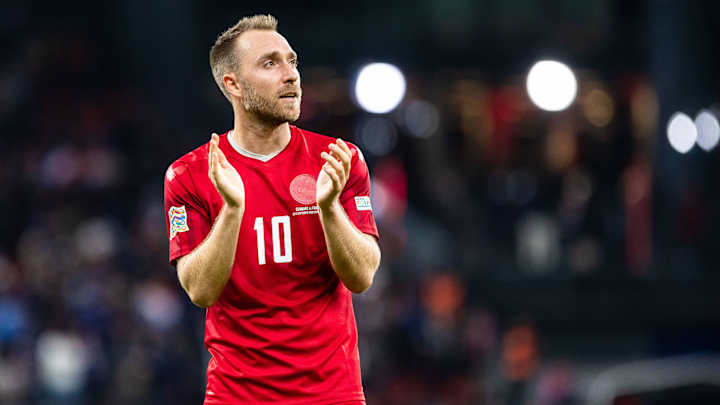Denmark 2022 World Cup Preview: With Eriksen Back, Another Inspired Run Could Follow

The story of Euro 2020 is back for more at the World Cup. Adversity struck early for Denmark early in the Euros when star Christian Eriksen collapsed with a cardiac arrest and had to be resuscitated. The near-death experience and jarring, emotional moment were followed by two subsequent losses, which were overcome as the Danes stormed into the semifinals—only to be stopped in an extra-time loss to England.
Hot off the heels of its best major tournament showing in the nation’s history, Denmark then rose to the occasion by winning nine of 10 qualifying matches and later picking up two wins against World Cup group stage opponent France in the UEFA Nations League. This is a side at the height of its powers at the right time.
Eriksen’s return—he scored two minutes into his first cap back with Denmark this past March—bolsters a solid team chock full of veterans who have experience playing against the world’s top sides. Kasper Schmeichel, while struggling to find his footing at new club Nice, has been a rock in goal for the Danes during the recent success. There’s a combination of aging leadership and youth in defense, and it scored more goals per game in qualifying than ever before. Playing in a manageable group, Denmark looks exactly like the type of squad that could make another surprise tournament run.
Group D Schedule (all times Eastern)
- Tunisia, Nov. 22, 8 a.m.
- France, Nov. 26, 11 a.m.
- Australia, No. 30, 10 a.m.
Coach
Kasper Hjulmand, hired in August 2020
Players to Watch
Christian Eriksen, midfielder
It shouldn’t be glossed over just how remarkable it is that Eriksen is playing at all, much less at a high level. His return to the pitch went swimmingly at Brentford before he made the summer move to Manchester United. His ability to play line-breaking passes adds a unique element to this squad in the attack.
Pierre-Emile Højbjerg, midfielder
The Tottenham midfielder stepped up in Eriksen’s absence at the Euros and played every minute in his side’s run to the semifinals, leading the way with his clean passing and defensive work rate. Højbjerg’s most notable attribute is his energy—only three midfielders covered more ground at Euro 2020.
Joakim Mæhle, wingback
Mæhle has played all over the pitch for club side Atalanta, but he is typically found bombing down the left flank for his nation. The 25-year-old adds an excellent wide option in the attack (two goals in the Euros and five in World Cup qualifying) and is at his best when cutting in on his favored right foot.
Breakout Candidate
Andreas Skov Olsen, winger
The 22-year-old attacking midfielder dominated the Danish Superliga before finding his way to Belgian side Club Brugge. He played a role in his team’s torrid finish to the season, scoring five goals and adding six assists in just nine matches.
Skov Olsen’s pace and technical ability make him a danger in one-on-one situations, particularly with slower defenders. He may have earned a starting role after a strong showing both in qualifying the Nations League. At the very least, Olsen would play a key role off the bench.
World Cup History
- Sixth appearance
- Last appearance: 2018 (Round of 16)
- Best finish: Quarterfinals in 1998
Outlook and Expectations
The run to the Euro 2020 semifinal was inspiring, but is it possible it was a fluke? Denmark lost the first two matches of the group stage and received favorable knockout stage matchups with Wales and the Czech Republic. Yet the recent results in the Nations League were more than promising. Two late one-goal losses to Croatia were the only dropped points in six matches, and several players who proved their worth in qualifying (notable Skov Olsen) performed brilliantly against France.
Tunisia and Australia provide relatively weak opposition for the second spot to get out of Group D. As evidenced by the Danes’ two Nations League victories, a result against France is not far-fetched, either. Topping the group would likely result in avoiding a round-of-16 matchup with Argentina, one of the favorites to win the tournament. Then, there’d be little in the way of Denmark building off that Euro 2020 run with another in Qatar.
World Cup Squad
GOALKEEPERS: Oliver Christensen (Hertha Berlin), Frederik Rønnow (Union Berlin), Kasper Schmeichel (Nice)
DEFENDERS: Joachim Andersen (Crystal Palace), Alexander Bah (Benfica), Andreas Christensen (Barcelona), Simon Kjær (AC Milan), Rasmus Kristensen (Leeds United), Jens Stryger Larsen (Trabzonspor), Joakim Mæle (Atalanta), Victor Nelsson (Galatasaray), Daniel Wass (Brøndby)
MIDFIELDERS: Thomas Delaney (Sevilla), Christian Eriksen (Manchester United), Pierre-Emile Højbjerg (Tottenham), Mathias Jensen (Brentford), Christian Nørgaard (Brentford), Robert Skov (Hoffenheim)
FORWARDS: Martin Braithwaite (Espanyol), Andreas Cornelius (Copenhagen), Mikkel Damsgaard (Brentford), Kasper Dolberg (Sevilla), Jesper Lindstrøm (Eintracht Frankfurt), Andreas Skov Olsen (Club Brugge), Yussuf Poulsen (RB Leipzig), Jonas Wind (Wolfsburg)
